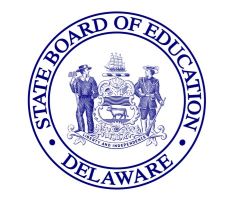
The Delaware State Board of Education (SBE) consists of nine members who are citizens of the State of Delaware. The SBE has a wide variety of roles and responsibilities. Meetings are held monthly and are open to the public.
Vision Statement
All Delaware students are engaged in learning that provides a foundation for success, preparing them to transition into postsecondary education and careers, engage with their communities, and continue to learn throughout their lives.
Mission Statement
In collaboration with community stakeholders, the Delaware State Board of Education provides voice and leadership for Delaware citizens to ensure that the education system meets the needs of each Delaware student.
Guiding Principles
The State Board remains committed to approaching its work through the following guiding principles:
- Equitable Opportunities: Support high-quality educational opportunities for all students that reduce disproportionate student outcomes by race, ethnicity, socioeconomic conditions, and residence.
- Student-Focused Education: Advocate for the development of the whole child, including strong academic, social-emotional, and physical health and safety practices that provide a rigorous, relevant, and relationship-based education.
- Collaboration and Partnerships: Engage and collaborate with the community and partners to enrich education policymaking with diverse perspectives that represent Delaware’s citizens.
- Data-informed Decision-making: Utilize national, state, and local research and data to inform decisions.
Roles and Responsibilities
The State Board of Education has a wide variety of roles and responsibilities, including:
- Advancing Education Policies and Systems
- Approving regulations governing 100+ topics, including approval of content standards, assessments, graduation requirements, educator evaluation, licensure and certification, and many others;
- Serving as the CTE Eligible Agency for the State Perkins Plan;
- Approving charter school authorizations—new, major modifications, renewals, and formal review.
- Providing Strategic Oversight and Advocacy
- Providing the breadth and viewpoint of a citizen’s board;
- Providing the Secretary of Education with advice in the development of policy, new initiatives,
- budget requests, etc.
- Resolving Disputes and Controversies
- Resolving disputes and controversies of the state education system, including school district boundaries, rules/regulations of local boards and student suspensions/expulsions for disciplinary reasons.
Members
The Delaware State Board of Education consists of nine members who are citizens of the State of Delaware. The Board is comprised of seven voting members and two non-voting members. Voting members are appointed by the Governor and confirmed by the State Senate. Members have residence in each of Delaware’s counties and the city of Wilmington, belong to different political parties, and bring a diverse set of skills and perspectives to the work. At least two members have previously served on a local board of education. Non-voting members are appointed annually by the Governor and include an 11th or 12th grade student currently enrolled in a public school and a former State Teacher of the Year.
Additional Information
Contact Information
For additional information you can email the State Board of Education office or call (302) 735-4010.
To be added to the State Board of Education’s email list, please send an email to the State Board of Education with the subject “SBE Mailing List.”
Mailing Address: Collette Education Resource Center, 35 Commerce Way, Suite 1, Dover, DE 19904

